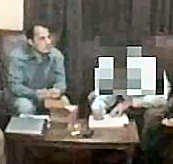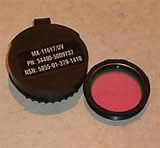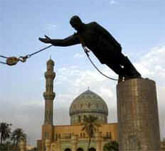
ABOVE: Amir Ardebili captured on
surveillance video in Tbilisi, Georgia
An eight-part series has been running this week in the Philadelphia Inquirer on the U.S. sting operation conducted against Iranian national Amir Ardebili, which this blog first reported on here. Needless to say, much of the series so far contains a number of interesting details not previously reported on the sting operation and presumably will contain even more fascinating details on the prosecution and plea bargain in the upcoming installments. So far, the series has glossed over the question of the legality of the U.S. operation under international law and why the U.S. chose to engage in such questionable tactics to spear such a small fish as Ardebili.
One interesting detail in the report relates how some grandstanding by a political appointee in the Justice Department threatened the investigators’ plan to whisk Ardebili back to the United States and throw him into a black hole while they searched his laptop, continued the investigation, and waited for months of solitary confinement to soften Ardebili up to the idea of a guilty plea. The political appointee wanted to announce the apprehension of Ardebili at a press conference as soon as Ardebili was in cuffs, which would, of course, lead to inconvenient questions about where Ardebili was. The investigators headed off this plan by having a judge in the United States put all the information on the operation and planned arrest under seal.
The series also has new video of what took place in the hotel room in Tbilsi where Ardebili was apprehended. I was particularly amused by the preposterous faux-Russian accent put on by a Customs investigator called “Darius.” It sounded like “Darius” had boned up on this over-the-top accent by listening to Boris and Natasha in old Rocky and Bullwinkle cartoons. In the videos, Ardebili seems at best naive as the investigators ask questions that more sophisticated persons would clearly see as unrelated to the business transaction at hand and simply designed to set him up. Frankly the questioning reminded me of the legendary SNL sketch where a badly wired Linda Tripp with a flower mike tried to extract information from Monica Lewinsky at the Pentagon City Ritz Carlton.
The series continues on Thursday and Friday. Read the whole thing.

 Posted by
Posted by  Category:
Category: 

 The Senate Foreign Relations Committee this afternoon
The Senate Foreign Relations Committee this afternoon 
 Face it, we export folks have always felt that we weren’t part of cool crowd. We work with agencies that absolutely no one else has ever heard of. Our shop talk is littered with more acronyms than your kid’s bowl of Alpha-Bits cereal. We have to advise people to comply with regulations that regularly prompt those people to say “Tell me you’re joking.”
Face it, we export folks have always felt that we weren’t part of cool crowd. We work with agencies that absolutely no one else has ever heard of. Our shop talk is littered with more acronyms than your kid’s bowl of Alpha-Bits cereal. We have to advise people to comply with regulations that regularly prompt those people to say “Tell me you’re joking.” On Monday, the Department of Treasury’s Office of Foreign Assets Control (“OFAC”)
On Monday, the Department of Treasury’s Office of Foreign Assets Control (“OFAC”) 

